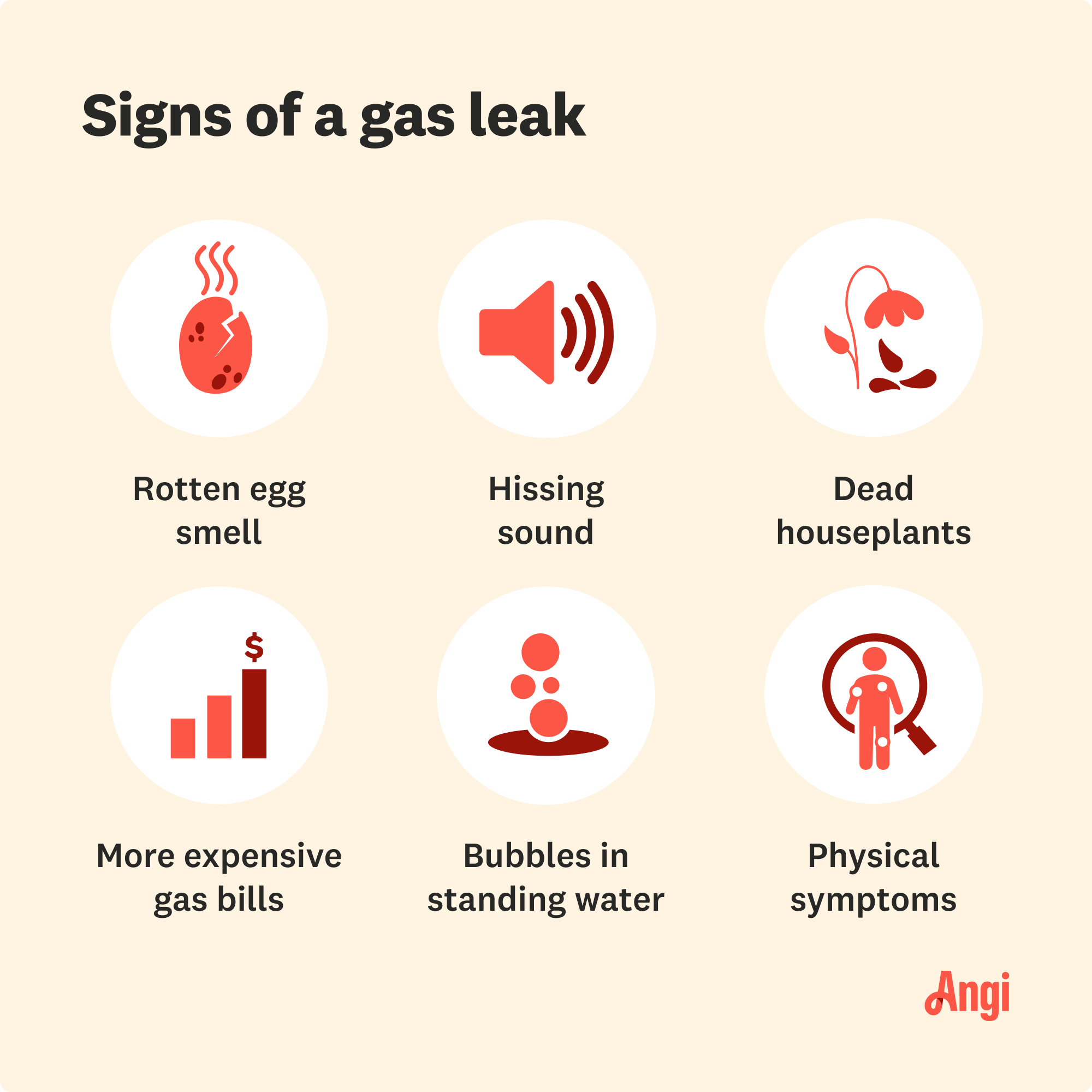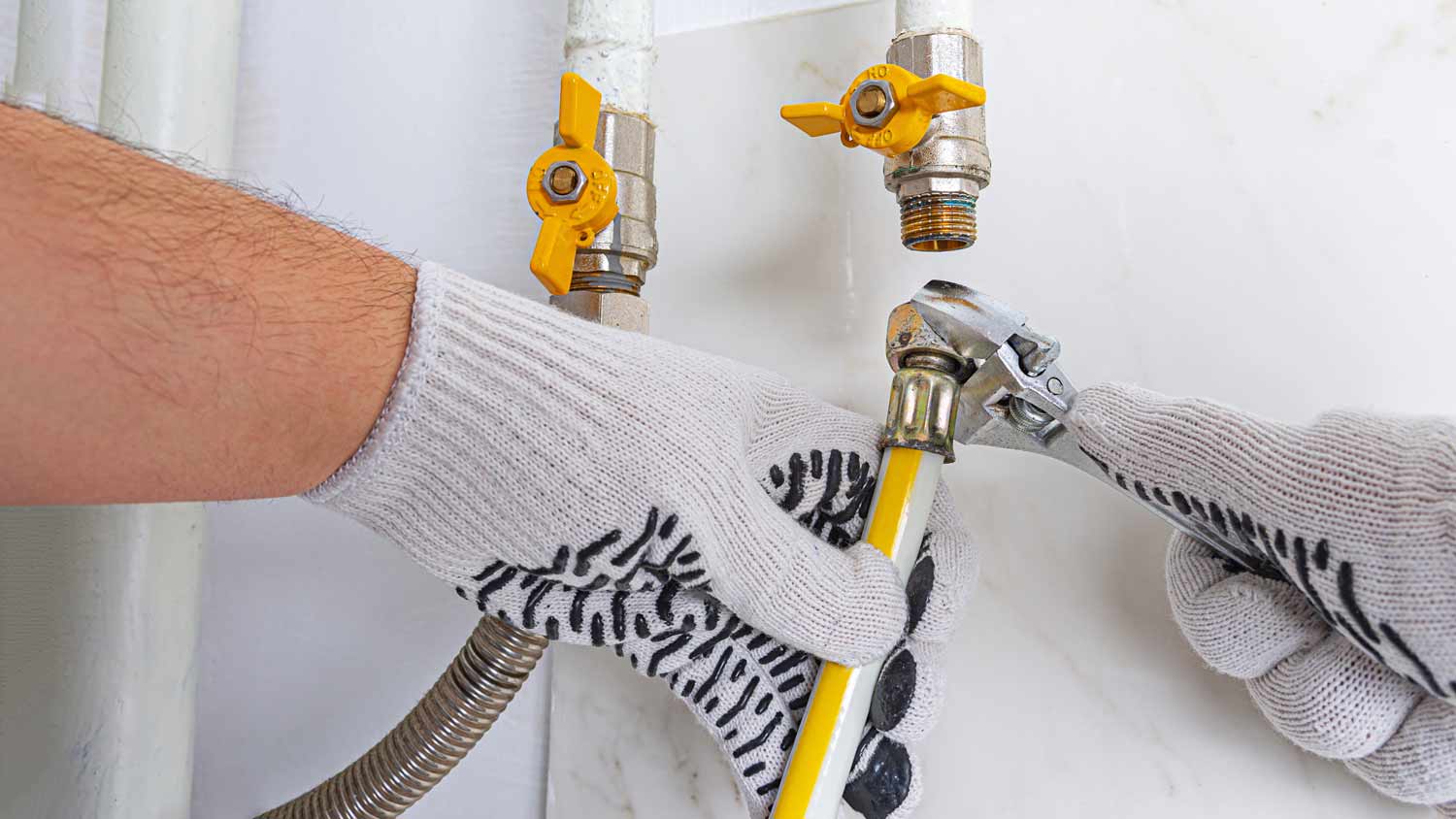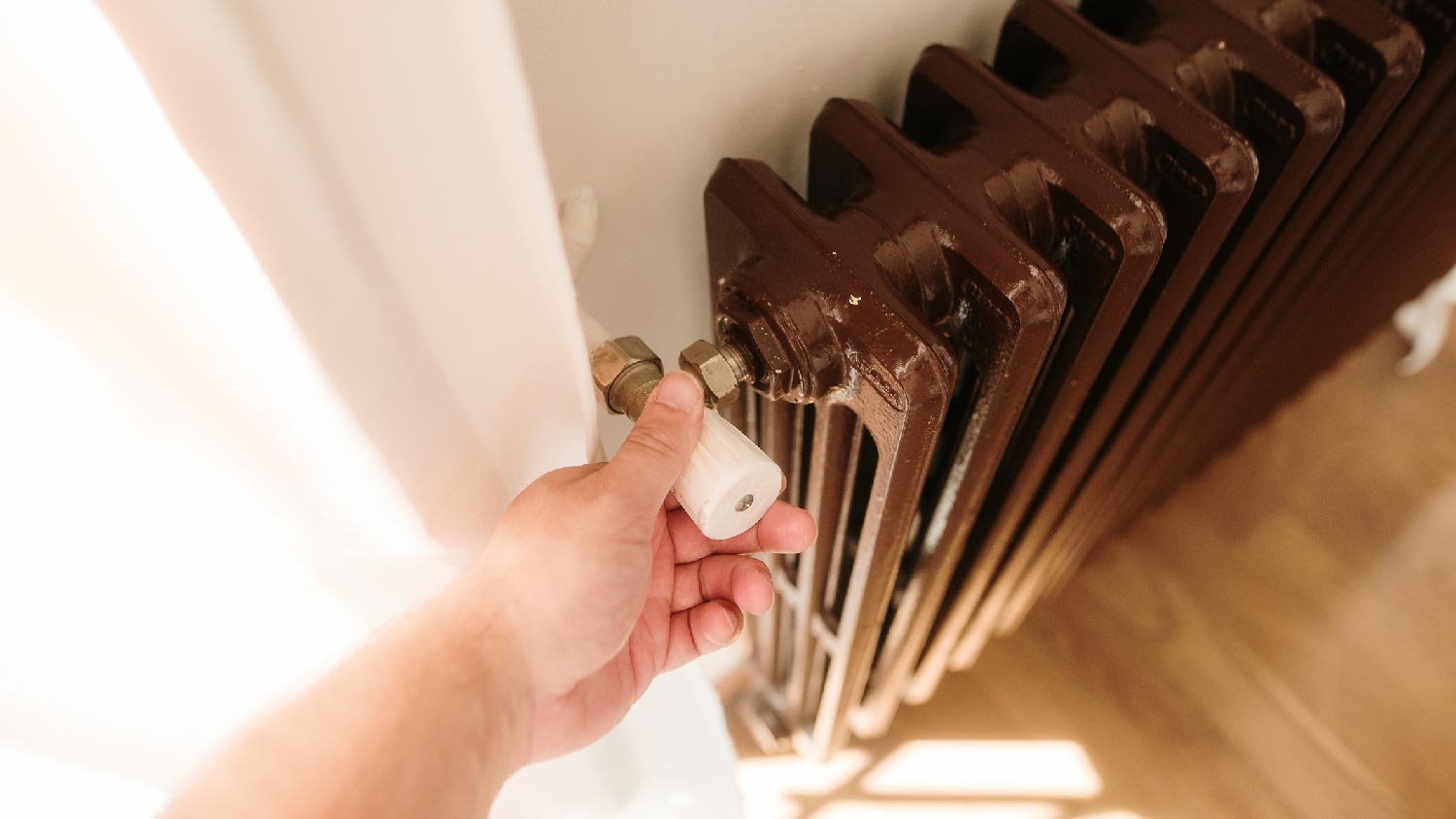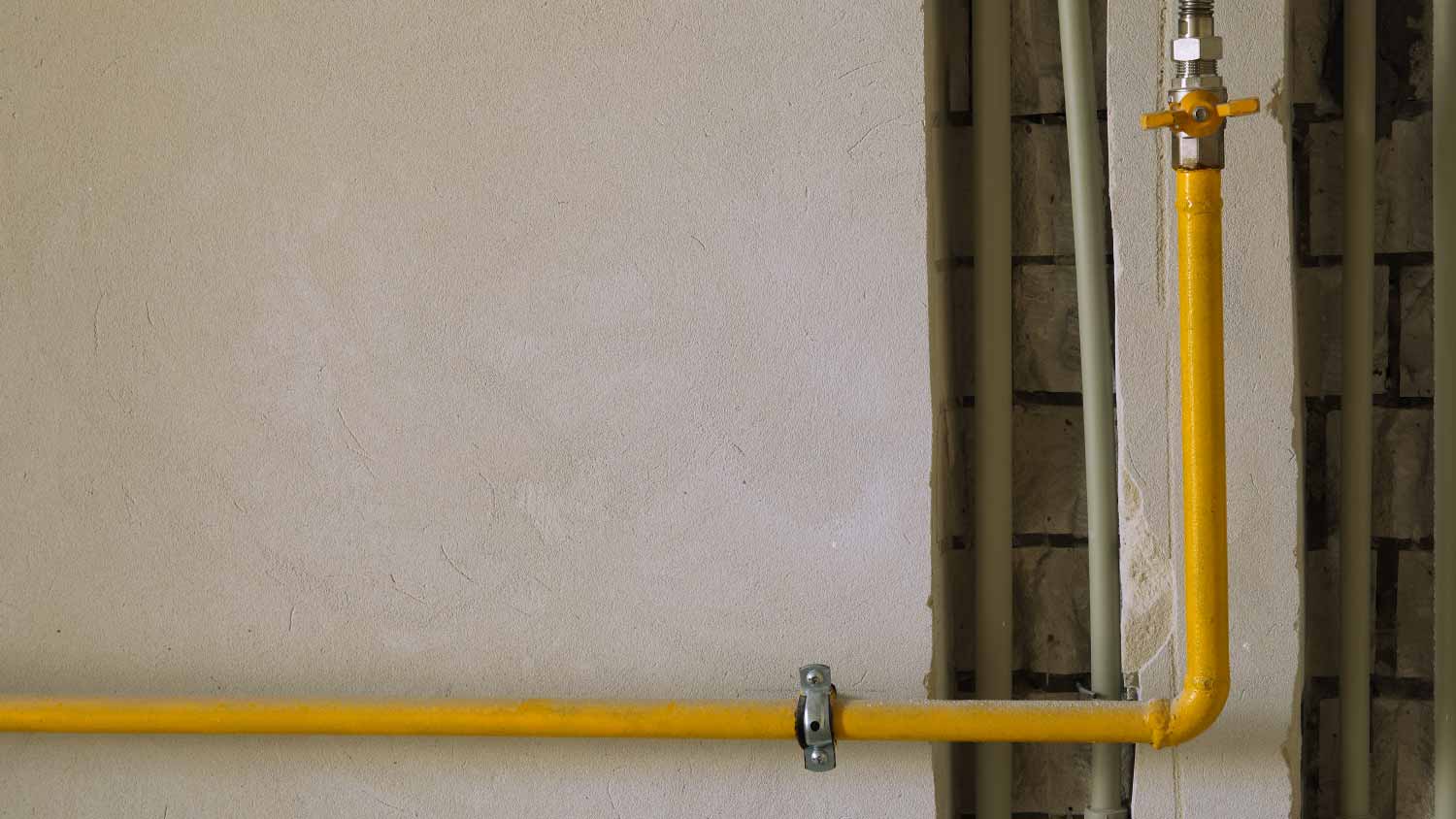
Find costs to repair a gas line and plan your budget based on the problem, from excavating for a new line to making a minor repair to an existing one.
Immediately treat signs of a gas leak in your house to keep your family safe


Leave your home immediately if you suspect a gas leak.
Dizziness and fatigue are physical signs of a gas leak.
A rotten egg smell and hissing are telltale gas leak signs.
Regular maintenance can prevent a gas leak in your home.
A carbon monoxide monitor can provide an early warning.
Gas leaks, which often happen quickly and unexpectedly, are very dangerous as they can lead to explosions, kill trees and other vegetation, and cause illness in humans and animals. They occur when natural gas leaks from a pipeline, storage tank, or other storage container. Understand the signs of a gas leak in your house and know what to do if you suspect one.

There are several telltale signs of a gas leak. Some signs may be more obvious than others. For example, you may notice that your oven smells like gas or a gas stove was left on without a flame. No matter how big or small, it’s important to take every sign seriously.
Perhaps the most obvious sign that your house has a gas leak is the smell. You may notice a sulfur-like stench often described as the smell of rotten eggs. In its purest form, natural gas does not have an odor. Mercaptans, sulfur-containing compounds, are added to natural gas, so it can be easily identified should a leak occur.
However, if you notice this smell coming from the bathroom, it could be sewer gas. Sewer gas can seep into your home through an unused drainpipe or broken toilet seal. You should treat this seriously, as some components of sewer gas can be highly toxic. A plumber can help diagnose and fix this issue.

Gas is transferred into homes by pressurized pipelines. If the pipeline is obstructed or leaks, the pressure can cause a hissing or whistling sound. Stay alert for these sounds coming from pipes or gas-powered appliances, even when the appliance is turned off.
Dead, or dying, plants may not be a reflection of your green thumb. Houseplants need fresh air, too, so be on the lookout for signs of decay or stunted growth—especially if you’ve been taking care of your plants. Natural gas blocks oxygen from absorbing into the plant’s roots. You may notice wilted leaves or yellow patches of grass near the gas line in your yard.

As gas seeps into your home, you may start to notice higher-than-normal gas bills. Keep an eye on your gas bill total, especially if you’re noticing a more expensive total, despite normal usage. Call your gas company to ask about the increase in your bill. If the company can’t explain why your bill has increased, they can send someone out to investigate the leak.
Signs of a gas leak can appear along the perimeter of your home. If you see bubbling in standing water or mud, it could be a sign of a leak. When there’s a leak, gas disperses through the soil and into the air.
Gas leaks impact more than just your home itself—they can have a physical impact on people and pets living in the home, too. Gas leaks impact the amount of available oxygen, and you might start to develop symptoms as you breathe in less oxygen. You might have a gas leak if you or others in your household are experiencing the following symptoms:
Eye and throat irritation
Fatigue
Nausea
Nosebleeds
Ringing in the ears
Breathing complications
Persistent headache
Dizziness or feeling lightheaded
Chest pains
Blisters and pale skin after direct contact with gas
Keep an eye on your pets. Gas leak symptoms in cats or dogs can present as:
Disorientation
Loss of appetite
Red, watery eyes
Vomiting
Breathing complications
Lethargy
Tip: Keep track of how you feel when you leave the house or move from room to room. If some of these symptoms appear shortly after entering your home or a certain room, you may have a gas leak.
Carbon monoxide poisoning is a life-threatening emergency that occurs when carbon monoxide builds up in the blood.
CO is a colorless, odorless gas made when fuels, such as wood, gasoline, coal, natural gas, or kerosene, burn. Malfunctioning appliances, such as clothes dryers, oven ranges, and water heaters, can all contribute to an excess of carbon monoxide in your home.
Carbon monoxide fumes prevent the body from using oxygen properly, which can harm the heart, brain, and other organs. Those with preexisting conditions, pregnant women, children, and the elderly, are at greater risk for harm.
Because CO is colorless and odorless, it’s important to be aware of the symptoms of carbon monoxide poisoning. The symptoms can be mistaken for the flu, and might include:
Headache
Weakness
Dizziness
Nausea or vomiting
Difficulty breathing
Confusion
Blurred vision
Drowsiness
Seizures
Chest pain
Loss of consciousness
Your doctor can diagnose CO poisoning if you believe you have been exposed.
Gas leaks should be treated seriously and with great urgency. Take the following steps if you think you’re dealing with a gas leak in your home.
If you’re experiencing strong physical symptoms or you notice a strong smell, evacuate your home as soon as possible, taking any pets with you. The longer you’re exposed to the gas, the more likely your symptoms are to worsen.
Once you’re in a safe place away from the potential leak, call your gas company and 911 to report your experience. Sometimes, a gas leak can be part of a larger issue. You could help yourself and others by reporting it. Also, professionals with the gas company will be able to confirm the leak and guide you through the next steps.
If you know where your gas meter is located, you can turn it off in emergency situations. Take a 12-inch or larger adjustable wrench and turn the shut-off valve ¼ turn in either direction, until it is crosswise to the pipe.
Put out any open flames (i.e., candles, gas stove burners, etc.), and do not light anything in your home. You should also avoid switching your lights on or off. Even a move as simple as this can cause sparks to ignite.
There are several steps you can take to prevent a gas leak from disrupting your life.
Keep your home gas leak-free with regular inspections and maintenance. This can include replacing old gas fittings and shut-off valves. Look for corroded, scaled fittings and rust and/or cracks on the pipes. You might also want to invest in the cost of an oven repair if your appliance is powered by gas. Once a year, have gas pipelines and gas-burning appliances checked out by a certified inspector for best results.
Carbon monoxide detectors do not detect natural gas, but they’re still important to have in your home. They alert you when appliances are improperly burning natural gas and other fossil fuels. This is especially helpful because a slow, gradual gas leak might not produce enough to be smelled. The U.S. Environmental Protection Agency recommends placing a carbon monoxide detector on each floor of the house.
Gas safety starts with proper installation. Make sure that any new gas broilers and appliances are installed by an accredited professional. Also, be mindful that older or secondhand appliances might need extra attention. Working with gas can be dangerous and hazardous to your well-being. In some cases, it’s best to forgo a well-intentioned DIY and call on a natural gas plumber to repair or install certain appliances. They have the knowledge and experience to do whatever you might need, from capping a gas line to inspecting a possible leak.
From average costs to expert advice, get all the answers you need to get your job done.

Find costs to repair a gas line and plan your budget based on the problem, from excavating for a new line to making a minor repair to an existing one.

Whether it's time for pipe replacement or to hook up the range of your dreams, gas line installation cost is an important line in your budget. Let's take a look.

Gas fitters and plumbers are both qualified to work on natural gas lines, but what you call them depends on where you live.

As temperatures plummet, you know to keep an eye out for frozen water pipes, but can gas lines freeze? Find out the answer and how to prevent major problems.

Gas line connections need special sealants. So can you use Teflon tape on gas lines? Here, we explore the safest way to seal gas fittings.

Installing a gas line is a job for a licensed plumbing professional. Let’s take a look at who installs gas lines and how much you can expect to pay.